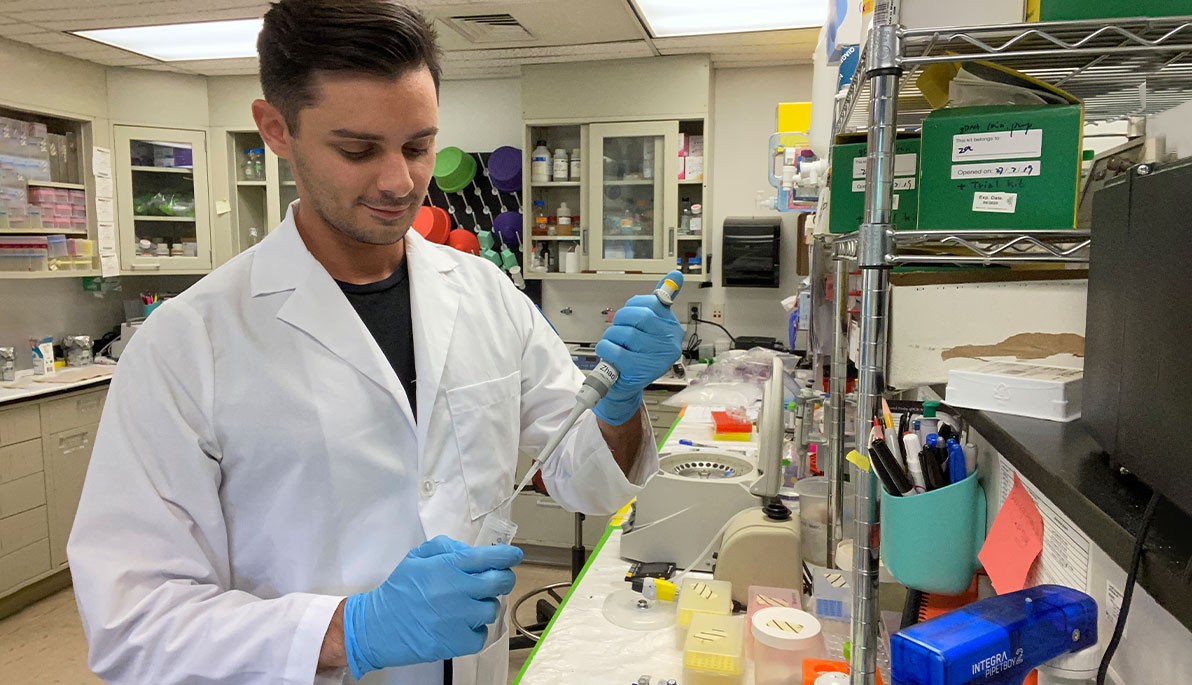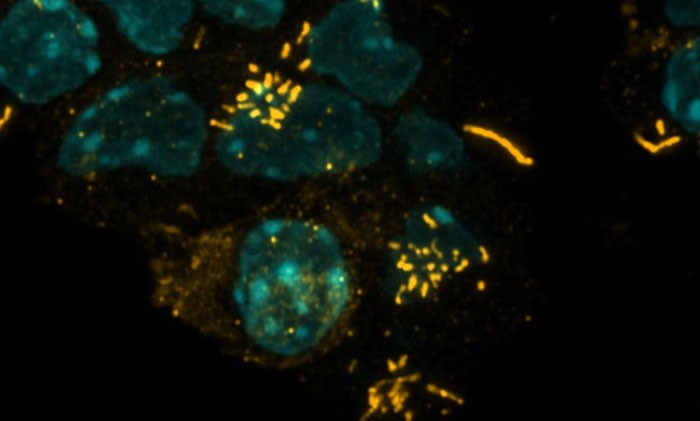
Fighting Childhood Brain Cancer
September 21, 2023
Pictured: Medical student Lukas Faltings is a key investigator in Associate Professor of Biomedical Sciences Haotian Zhao’s lab.
September is Childhood Cancer Awareness Month—a time to recognize the more than 15,000 children who are diagnosed with cancer each year in the United States, according to the National Cancer Institute. But honor, awareness, and the search for a cure is not confined to the ninth month of the year.
At the College of Osteopathic Medicine (NYITCOM), Associate Professor of Biomedical Sciences Haotian Zhao, M.D., Ph.D., is conducting research on choroid plexus carcinoma (CPC), a rare, aggressive brain tumor occurring primarily in children. These cancerous masses form within brain tissue that secretes cerebrospinal fluid and tend to respond poorly to existing cancer treatments.
With his most recently secured funding, a three-year U.S. Department of Defense (DoD) Rare Cancers Research Program Idea Development Award totaling $499,800, Zhao continues his research to understand and explain the molecular processes responsible for CPC. Through his work, he hopes to uncover therapeutic targets for the development of safer and more effective therapies to suppress tumor growth without damaging children’s developing brains.
A key investigator in Zhao’s cancer research lab is Lukas Faltings, a student in his third year of NYITCOM’s D.O./Ph.D. program (osteopathic medicine/medical and biological sciences). Faltings uses molecular biology assays, in-vitro culture experiments, and animal models to understand the development of CPC.

Choroid plexus tumors (teal) receive a treatment to restore multicilia (yellow), which was shown to decrease tumor growth.
Faltings brings with him to Zhao’s lab his experience and skills gleaned from a neurosurgical-oncology clinical research fellowship at Lenox Hill Hospital in New York City, where he worked with brain tumor patients. He says it was those patients with glioblastoma, a high-grade, aggressive brain tumor, who had a profound effect on his decision to pursue physician-scientist training.
As the research team leverages developmental biology to understand CPC on a biological level, Faltings is using his involvement in the lab to bolster his Ph.D. dissertation research, which he hopes to defend in summer 2024. His thesis work explores the interplay of critical transcription factors in CPC development.
“I am interested in studying tumor heterogeneity and cancer biology. Working in Professor Zhao’s lab has enabled me to study these topics while contributing research on a rare tumor that has devastated patients with poor outcomes for decades,” says Faltings. “There are many ‘whys’ left in brain cancer, and those who have to face these diagnoses are relying on us to answer these questions.”
In June, Faltings participated in the Pediatric Neuro-Oncology Research Conference in Washington, D.C., where he delivered his oral presentation, “Dissecting Cellular Differentiation Heterogeneity in Choroid Plexus Carcinoma Pathogenesis.” He discussed the work he and Zhao’s research team are performing to understand the dynamics of the cell population within CPC.
Looking back on the Washington, D.C., conference and the presentations and physicians he witnessed, Faltings says the future of pediatric brain cancer looks promising as researchers collaborate to better understand these tumors and guide novel treatments.
Further supplementing his studies was Faltings’ July trip to Hamburg, Germany, where he spoke at the University Medical Center Hamburg-Eppendorf on his work in Zhao’s lab to understand the biology of CPC. Faltings is no stranger to Hamburg. In 2022, he presented a poster detailing the critical role of the transcription factor Sox2 in CPC at the International Symposium on Pediatric Neuro-Oncology.
Once he is out in the field as a full-fledged physician-scientist, a highly trained clinician who treats patients and conducts skilled biomedical research, Faltings says he will be tackling one of the challenges seen in many aggressive brain tumors—heterogeneity. That is, not all cells within a tumor are the same, but they function as a unit to inflict devastating consequences.
“I plan to investigate how we can leverage our knowledge of these diverse tumor compartments to predict tumor evolution and treatment response,” says Faltings, whose goal is to become a practicing surgeon-scientist offering patients personalized cancer care by bridging advancements in biomedical research and clinical trials. “I am drawn to the combination of oncology and surgery. Currently, my top specialty of interest is neurosurgery.”
But until he is ready to graduate, Faltings continues his research with Zhao, studying CPC, learning new techniques, improving his skills, and making connections with fellow researchers.
“Childhood cancer awareness is so important to me,” he says. “The work we are doing in studying CPC is crucial because no one with a rare cancer diagnosis should feel like they are forgotten.”
More Features

An Alumnus’ Commitment to the Environment
As an energy management graduate from New York Tech’s Vancouver campus, Jasdeep Gulati (M.S. ’22) is highly invested in educating people about environmental and climate sustainability.

Vancouver Faculty Win University-Sponsored Research Awards in New Program
The new Global Impact Research Grant (GIRG) program has been developed to keep Vancouver-based faculty connected to faculty and research projects being conducted on the university’s New York campuses.

Studying Climate Change One Degree at a Time
Junhua Qu (M.S. ’24) began her collegiate journey in Beijing. But, her interest in climate change took her to New York Tech’s Vancouver campus to study energy management.
